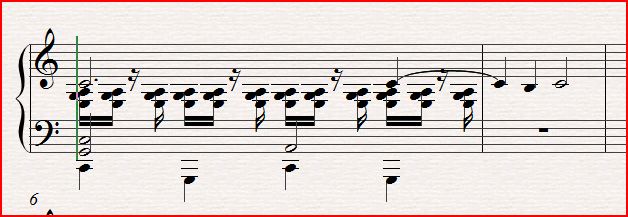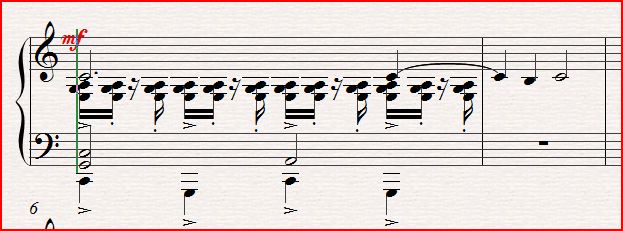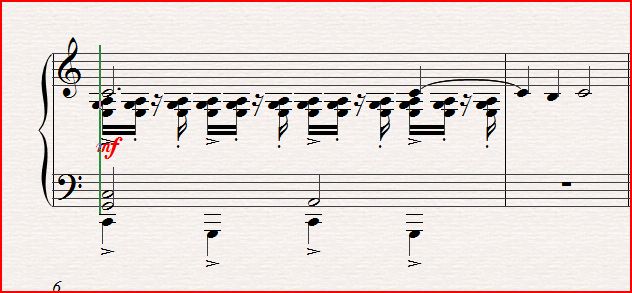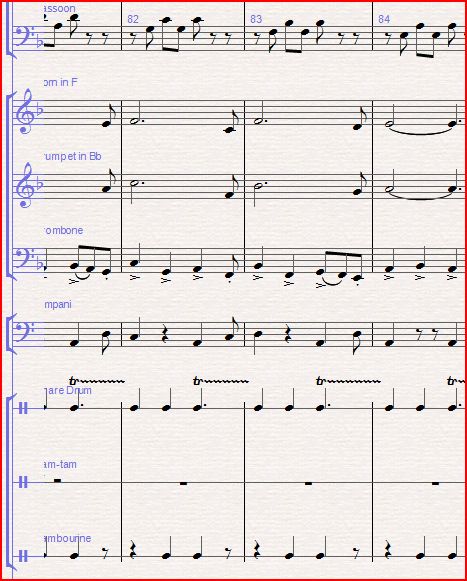I always find it very hard to review a demo of a programme, seeing as it is impossible to do any “proper” work on it due to the fact that saving is disabled. However, for what I have tried, here’s what I think about some of the new features, with some miscellaneous points at the end.
Magnetic Layout
This is very good. I will say that now, before I go on to criticise minor points, as it is very good, and deserves a great deal of praise. I do, however, still have some small niggles with it. When creating a dynamic marking for a low note, the dynamic marking is slightly too close to the note for my taste. However, I see that this can be altered, and I will obviously play around with this kind of thing when I have purchased it fully. The grouping of dynamics and lyrics are excellent, and will save me a great deal of time. Also, the tool to “Optimise staff spacing” will be incredibly useful, as I always used to end up dragging the staves apart anyway. However, opening old scores there are difficulties. Objects that I had previously arranged to avoid clashes are now coloured red, which denotes a clash. However, I’m sure that this will not happen to newly created scores, and I can’t wait to try composing a full orchestral piece with the new layout options to see its full potential.
I opened up one previous score that I had difficulties with layout in the past: an arrangement of I am what I am from “La cage aux follies”. This is just an arrangement for solo voice and piano, but the piano accompaniment is incredibly complex, using a great deal of two part work in the right hand. In Sibelius 5, I had to move second part rests out of the way from lower first part notes myself. This was enough of a task on its own, but then they clashed with the dynamics and other objects below the stave. I wondered if Sibelius 6 would handle this any better? I recreated one such bar in the piano part from scratch in Sibelius 6. On entry, this was what it looked like.  The second part rests have not automatically jumped down to align with the range of the notes in the second part. For the most part, this doesn’t matter too much, but in the final beat there is the unsightly clash with the tie in the first part. This has not been altered by Magnetic Layout, or recognised as a clash by turning the rest/tie red. I then selected “Optimise staff spacing” and manually moved each rest down two “notches” by the keyboard, leaving this effect:
The second part rests have not automatically jumped down to align with the range of the notes in the second part. For the most part, this doesn’t matter too much, but in the final beat there is the unsightly clash with the tie in the first part. This has not been altered by Magnetic Layout, or recognised as a clash by turning the rest/tie red. I then selected “Optimise staff spacing” and manually moved each rest down two “notches” by the keyboard, leaving this effect:  This is much better, and easier than this effect could be achieved in Sibelius 5, but I was half expecting Sibelius 6 to remove the need for the manual work and jump directly to the second step. I then inserted articulation markings and a dynamic marking, leaving the following view:
This is much better, and easier than this effect could be achieved in Sibelius 5, but I was half expecting Sibelius 6 to remove the need for the manual work and jump directly to the second step. I then inserted articulation markings and a dynamic marking, leaving the following view:  This is quite clearly unacceptable, as Sibelius cannot avoid these clashes. At least the dynamic marking is coloured red, so the programme realises that there is a clash, more than can be said of the clash between the first accent and the stem of the left-hand note. Selecting “Optimise staff spacing” leaves this, an improvement, but still not quite right:
This is quite clearly unacceptable, as Sibelius cannot avoid these clashes. At least the dynamic marking is coloured red, so the programme realises that there is a clash, more than can be said of the clash between the first accent and the stem of the left-hand note. Selecting “Optimise staff spacing” leaves this, an improvement, but still not quite right:  Iwould move the dynamic marking down myself to make this finally acceptable, but I cannot, it is snapped into the collision with the accent. I therefore have to turn off Magnetic Layout to move it, and avoid the clash. This scenario comes up many times in this arrangement, and I’m sure that this is not an uncommon problem. Sibelius 6 deals with it better than Sibelius 5 did, but the Magnetic Layout is still lacking, as I was hoping for an automatic solution. If this has to be done for every bar (although admittedly the Optimise Staff Spacing option only has to be done a few times), then it can become very time consuming. This is disappointing for me, as it was the type of problem I hoped would be solved.
Iwould move the dynamic marking down myself to make this finally acceptable, but I cannot, it is snapped into the collision with the accent. I therefore have to turn off Magnetic Layout to move it, and avoid the clash. This scenario comes up many times in this arrangement, and I’m sure that this is not an uncommon problem. Sibelius 6 deals with it better than Sibelius 5 did, but the Magnetic Layout is still lacking, as I was hoping for an automatic solution. If this has to be done for every bar (although admittedly the Optimise Staff Spacing option only has to be done a few times), then it can become very time consuming. This is disappointing for me, as it was the type of problem I hoped would be solved.
Revisions
I cannot comment on this, as they cannot be created in the Demo as this constitues saving. Looking through the example scores, however, it looks like a very useful feature, one that I will use a great deal.
Other features
I must admit that I haven’t really looked at the other features in any great detail, as I will not use them as much as the two above. A few other points of note, however. The keypad now has an extra view, for Jazz engraving, and this means that the default view’s shortcut is now F7, as opposed to F8 previously. I had always assumed that F8 was chosen because it was the end of the set of four F keys on most keyboards, therefore making it easier to find. This is obviously no longer the case, and I find that quite disappointing, as it was certainly how I found F8 quickly. The bright side is that the new view is very useful, saving plenty of time with repeat bars and arpeggio figures.
I am not too big a fan of the pale page numbers in the navigator – it makes it difficult for me to see the page numbers – nor the extra buttons on the playback bar – it is a bit too long now – but these are minor niggles. A final point is that I think there is a bug in the Panorama setting – this is seen, whereas previously the names were full and not chopped off. It seems to happen at certain vertical positions on the page, with it being OK at other points.

It almost goes without saying that once again Sibelius 6 is a joy to use, and a great product. These are little niggles, and despite these I will be upgrading. However, I still feel that my earlier post is justified – it feels as if there is no giant leap forward in this version.
 The second part rests have not automatically jumped down to align with the range of the notes in the second part. For the most part, this doesn’t matter too much, but in the final beat there is the unsightly clash with the tie in the first part. This has not been altered by Magnetic Layout, or recognised as a clash by turning the rest/tie red. I then selected “Optimise staff spacing” and manually moved each rest down two “notches” by the keyboard, leaving this effect:
The second part rests have not automatically jumped down to align with the range of the notes in the second part. For the most part, this doesn’t matter too much, but in the final beat there is the unsightly clash with the tie in the first part. This has not been altered by Magnetic Layout, or recognised as a clash by turning the rest/tie red. I then selected “Optimise staff spacing” and manually moved each rest down two “notches” by the keyboard, leaving this effect:  This is much better, and easier than this effect could be achieved in Sibelius 5, but I was half expecting Sibelius 6 to remove the need for the manual work and jump directly to the second step. I then inserted articulation markings and a dynamic marking, leaving the following view:
This is much better, and easier than this effect could be achieved in Sibelius 5, but I was half expecting Sibelius 6 to remove the need for the manual work and jump directly to the second step. I then inserted articulation markings and a dynamic marking, leaving the following view:  This is quite clearly unacceptable, as Sibelius cannot avoid these clashes. At least the dynamic marking is coloured red, so the programme realises that there is a clash, more than can be said of the clash between the first accent and the stem of the left-hand note. Selecting “Optimise staff spacing” leaves this, an improvement, but still not quite right:
This is quite clearly unacceptable, as Sibelius cannot avoid these clashes. At least the dynamic marking is coloured red, so the programme realises that there is a clash, more than can be said of the clash between the first accent and the stem of the left-hand note. Selecting “Optimise staff spacing” leaves this, an improvement, but still not quite right:  Iwould move the dynamic marking down myself to make this finally acceptable, but I cannot, it is snapped into the collision with the accent. I therefore have to turn off Magnetic Layout to move it, and avoid the clash. This scenario comes up many times in this arrangement, and I’m sure that this is not an uncommon problem. Sibelius 6 deals with it better than Sibelius 5 did, but the Magnetic Layout is still lacking, as I was hoping for an automatic solution. If this has to be done for every bar (although admittedly the Optimise Staff Spacing option only has to be done a few times), then it can become very time consuming. This is disappointing for me, as it was the type of problem I hoped would be solved.
Iwould move the dynamic marking down myself to make this finally acceptable, but I cannot, it is snapped into the collision with the accent. I therefore have to turn off Magnetic Layout to move it, and avoid the clash. This scenario comes up many times in this arrangement, and I’m sure that this is not an uncommon problem. Sibelius 6 deals with it better than Sibelius 5 did, but the Magnetic Layout is still lacking, as I was hoping for an automatic solution. If this has to be done for every bar (although admittedly the Optimise Staff Spacing option only has to be done a few times), then it can become very time consuming. This is disappointing for me, as it was the type of problem I hoped would be solved.